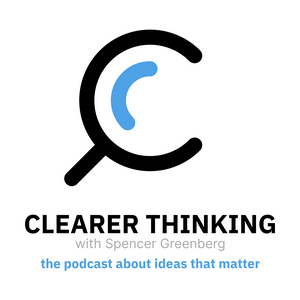Read the full transcript here.
If you enjoy our podcast, we have some exciting news – we’ve just launched a new membership called Clearer Thinking Plus.
Members get this podcast completely ad-free, as well as two professional coaching sessions every month, access to our advanced cognitive assessment, and seven other exclusive perks.
Clearer Thinking Plus is one of the most affordable ways to get access to a high-quality coach - whether you want to improve your habits, find more effective ways to work towards your goals, or get assistance making difficult decisions. It is also a more affordable and convenient way to get all the perks we offer.
If you're not interested in coaching, you can still get ad-free access to this podcast and the other perks with our explorer plan.
Access www.clearerthinking.org/plus to become a member today. We hope to see you there!
What changes when anyone can clone your voice from a minute of audio? If voice ID can be spoofed, what replaces it for everyday security? Why are phone scams evolving faster than our intuition for trust? What new “attack surfaces” appear when every service talks to you digitally? How much paranoia is rational before security becomes a tax on living? Could AI that talks to scammers become a tool for studying persuasion tactics at scale? What’s the most reliable habit for verifying calls, texts, and links? Are we entering a world where identity is probabilistic rather than certain? What do “AI employees” reveal about where agents shine and fail? Why do autonomous agents need triggers and stop conditions to behave? If an agent’s “memory” is a growing log, what kinds of false selves can it accidentally create? How do edge cases derail agents in ways humans handle effortlessly? Why is “be helpful” a dangerous default for external-facing bots? If someone can fake familiarity, how easily can they rewrite an agent’s memory? When you can’t see the system prompt, what are you really evaluating? Should we say please to machines, and what habits does that build in us? If we can’t tell performance from experience, how should we treat AI under uncertainty?
Evan Ratliff is a longtime journalist, writer and host of Shell Game, the podcast and newsletter about things that are not what they seem.
Links:
Evan's Podcast: Shell Game
Evan's X Profile
Staff
Spencer Greenberg — Host + Director
Ryan Kessler — Producer + Technical Lead
WeAmplify — Transcriptionists
Igor Scaldini — Marketing Consultant
Music
Broke for Free
Josh Woodward
Lee Rosevere
Quiet Music for Tiny Robots
wowamusic
zapsplat.com
Affiliates
Clearer Thinking
GuidedTrack
Mind Ease
Positly
UpLift
[Read more]


